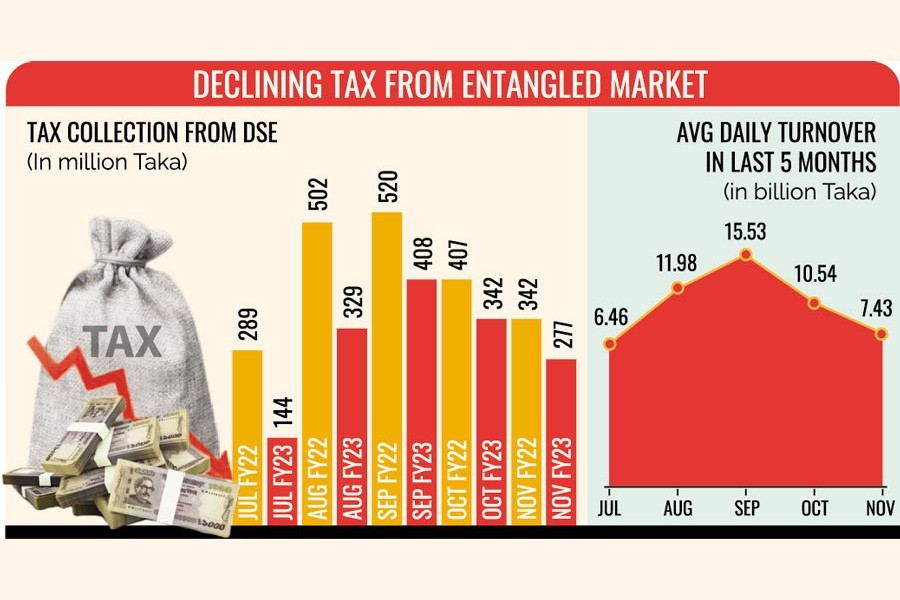In a chain reaction, tax collection from the Dhaka Stock Exchange dropped over the last five months, compared to the corresponding period last year.
At first, sluggish economy drag the market down. The price movement restriction was then imposed to prevent a further decline.
Stocks fell to hit the floor. A lack of buyers left the sellers at bay. Unable to liquidate securities, many investors could not get cash to buy new stocks while many felt discouraged to make fresh investments.
During the time, sponsor-directors also sold a scant amount of their holdings.
This is the backdrop to the daily average turnover going down sharply since September this year. As a result, the government's revenue from the market operations was reduced by 19 per cent month-on-month in November to Tk 277 million.
In the five months through November, tax from the DSE slumped 27 per cent year-on-year to Tk 1,500 million, DSE data shows.
The government collects tax in TREC (trading right entitlement certificate) holders' commission and from share sales by sponsor-directors and placement holders at the rate of 0.05 per cent and 5 per cent respectively.
Of the total income in July-November of the current fiscal year, Tk 1,123 million came as tax from the TREC holders' commission, popularly known as brokerage commission, and Tk 377 million from share sales by sponsor-directors and placement holders.
"The earnings are related to turnover. It's usual that tax will fall if the turnover falls," said a top DSE official, requesting anonymity.
The ongoing sluggish trading activities coupled with low share sales by sponsor-directors reduced the government's income from the prime bourse, he added.
The daily average turnover on the DSE plunged by almost 30 per cent month-on-month to Tk 7.43 billion in November.
Investors are not confident enough to inject fresh funds into stocks amid the floor price limitation, which leads to lower turnover, said Md Sajedul Islam, senior vice-president of the DSE Brokers Association of Bangladesh.
Trapped in such a stagnant market, most of the brokerage firms have been finding it hard to meet operational costs as their main income source -- transaction fees -- dropped significantly due to low turnover, he said.
Currently, a brokerage firm receives Tk 0.30 to Tk 0.40 in fees for each transaction of Tk 100.
Although the turnover has remained low, the operational cost of brokerage firms soared due to high inflation, said Mr Islam, also managing director of Shyamol Equity Management.
The market has been struggling since the Russia-Ukraine war began in February this year. A sharp erosion of stock prices prompted the securities regulator to impose the floor price on July 28 this year.
The large-cap stocks which dominated the market turnover chart earlier have remained stuck at the floor, said a merchant banker.
More than 80 per cent stocks, including Grameenphone, Square Pharma, Walton, British American Tobacco, and Robi Axiata have hit the floor. The stocks are not moving up amid a shortage of buyers.
The gloomy macroeconomic outlook weakened investors' confidence. Individual investors prefer to hold cash to meet the rising living costs instead of making any investment in stocks.
The floor price system stopped free-fall of indices. But the foreign and institutional investors have been upset about it as they could not buy shares in large volumes at lucrative prices.
A top official of Investment Promotion Services Ltd said the number of stock investors had fallen in the last few months and so did investments.
Some 0.21 million beneficiary owners' accounts have closed since the start of the war, according to the Central Depository Bangladesh data.
The prime bourse itself is under pressure. The DSE needs to generate at least Tk 10 billion in daily turnover to make profit, said an official from the bourse.
In the last fiscal year, the government earned Tk 2.91 billion in tax revenue from the DSE, the highest in 11 years, driven by a record turnover.
The fiscal 2010-11 witnessed the historical highest tax revenue of Tk 4.47 billion paid by the DSE to the government exchequer when the market had gone haywire before crashing.


